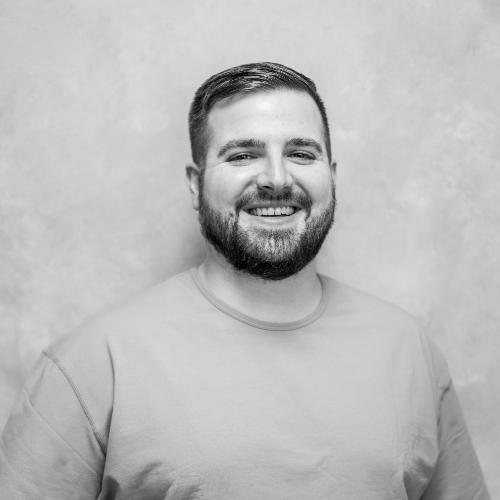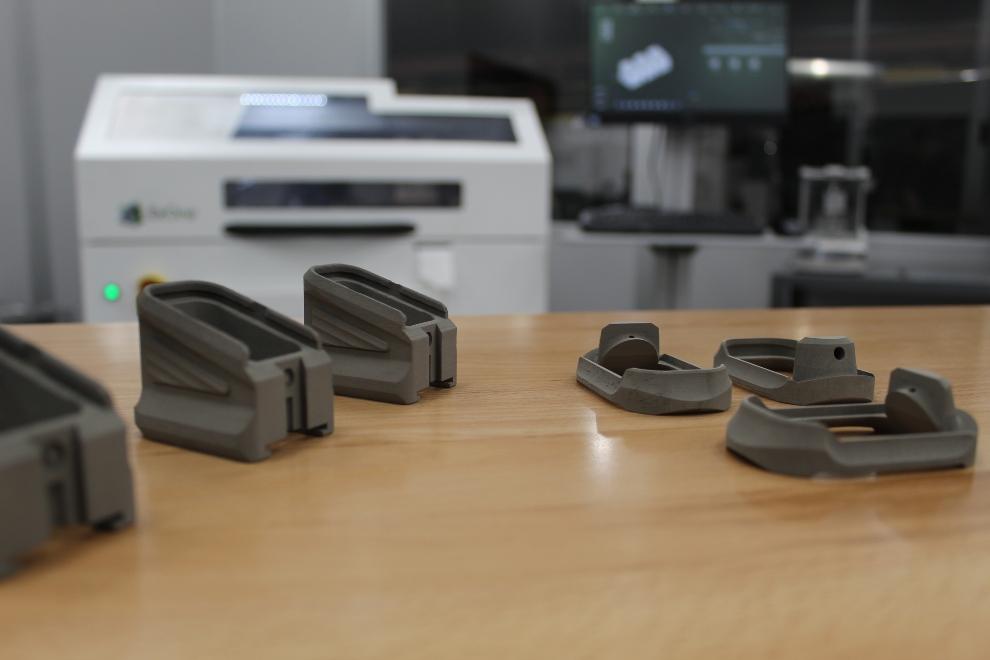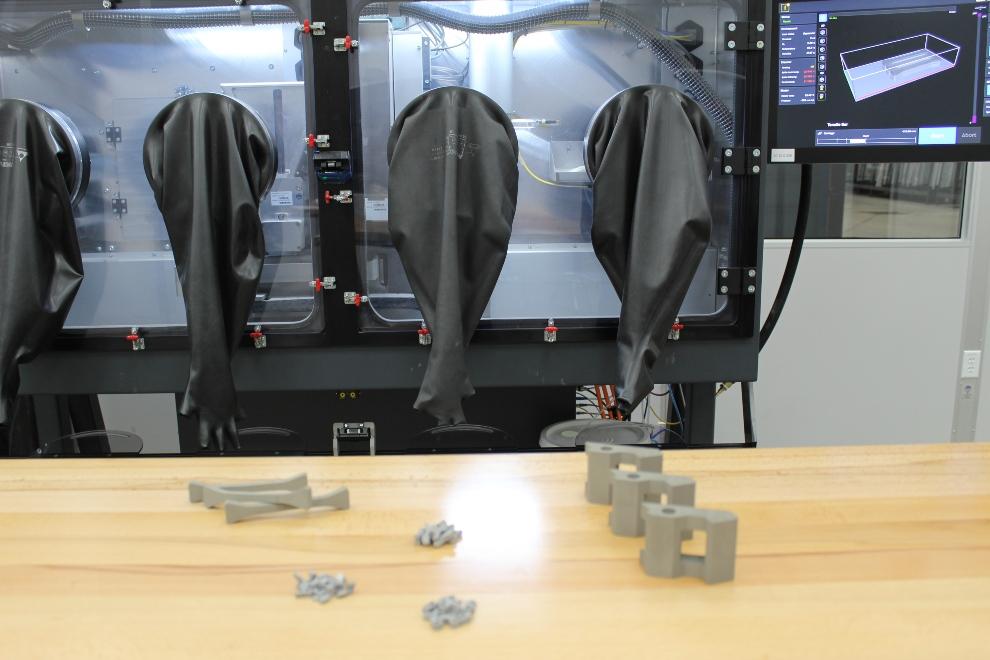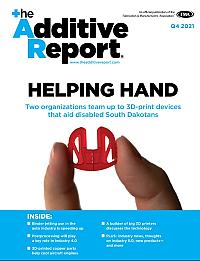Editor-in-Chief
- FMA
- The Fabricator
- FABTECH
- Canadian Metalworking
Our Publications
Categories
- Additive Manufacturing
- Aluminum Welding
- Arc Welding
- Assembly and Joining
- Automation and Robotics
- Bending and Forming
- Consumables
- Cutting and Weld Prep
- Electric Vehicles
- En Español
- Finishing
- Hydroforming
- Laser Cutting
- Laser Welding
- Machining
- Manufacturing Software
- Materials Handling
- Metals/Materials
- Oxyfuel Cutting
- Plasma Cutting
- Power Tools
- Punching and Other Holemaking
- Roll Forming
- Safety
- Sawing
- Shearing
- Shop Management
- Testing and Measuring
- Tube and Pipe Fabrication
- Tube and Pipe Production
- Waterjet Cutting
Industry Directory
Webcasts
Podcasts
FAB 40
Advertise
Subscribe
Account Login
Search
Interview with Chris Aiello, co-owner of a new binder-jet 3D printing shop
Wide-ranging conversation about metal additive manufacturing, parts designing, and future of AM
- By Don Nelson
- February 4, 2021
- Article
- Additive Manufacturing
Who would start a business during a global pandemic? A lot of people. The U.S. Census Bureau reports that the number of Americans applying to start a new business rose 42% between 2019 and 2020.
Four of those individuals—Nate Higgins, Chris Aiello, Andy Reasinger, and Eric Wonderling—recently co-founded a new 3D printing service bureau in St. Marys, Pa. FreeFORM Technologies, which incorporated in October 2020, is dedicated to metal binder-jet printing.
“We believe in the technology, and we’ve invested heavily in the technology,” said Aiello. “We’re ready to print high volumes of product using metal binder jetting.”
The Additive Report recently interviewed Aiello, questioning him about founding a business during the COVID-19 pandemic, why the company is focused on binder-jet printing, designing for additive manufacturing, and how additive manufacturing technology could be improved.
Following is an edited excerpt of the conversation between Aiello and AR Editor-in-Chief Don Nelson.
Additive Report: We’re in the middle of a global pandemic. Businesses are suffering. People are hanging on by their fingertips. Why is this a good time to start a 3D printing service bureau?
Chris Aiello: You’re not the first person to ask that question. It was kind of a perfect storm for us. Two of our co-founders were ready to start a business around metal additive. Eric has been in the additive space for a long time on the equipment and software sides. Andy is an electrical engineer who does a ton of high-value-add automation. He’s always using additive tools for end-of-arm tooling or fixtures. And Nate and I have a background in metal parts [including MIM—metal injection molding—and 3D printing].
Being in a pandemic made things a little tricky, like when you have to tell your wife you’re quitting your job in the middle of a pandemic [laughs]. But it was good from a customer perspective and prospect perspective to be able to slow down a bit. People weren’t ready to spend money on parts. So being able to slow down and get our business set up the way we wanted and get our equipment laid out the way we wanted was good.
We were able to drive FreeFORM forward and are ready for 2021 and the future of manufacturing.
AR: There’s a fair number of service bureaus out there. What differentiates you guys?
Aiello: A lot of service bureaus for metal are DMLS [direct metal laser sintering]. Some have binder jetting as a bolt-on to their other manufacturing techniques, but binder jetting is the main focus of our company. We also have experience with sintering. Being able to marry our binder-jet and sintering expertise makes us different than other suppliers.
Our biggest competition, frankly, is our equipment supplier’s additive centers [ExOne Adoption Centers]. One reason they have the centers is because nobody else was willing to be a parts-maker.
AR: Briefly explain how binder jetting works and how it differs from other types of metal AM.
Aiello: In the simplest of printing terms, think of the metal powder as your paper and the binder as your ink. Every time rollers or ultrasonics move across the powder bed, it is just like your printer moving paper underneath your printhead.
As we’re inkjet-binding the shape of our part in the Z-direction, the free powder in the bed supports the part. So you have very little support structures like you do with the other metal technologies.
AR: What kind of binder-jet equipment do you operate?
Aiello: We took delivery of an ExOne Innovent+ in late November, and at the beginning of the year we installed a Desktop Metal P-1 Production system, which uses their Single Pass Jetting technology.
AR: What other services do you offer besides binder jetting?
Aiello: We have some plastic offerings. We have a couple of Formlabs machines and an Ultimaker. An interesting development concerning plastic is the BASF material that’s out there for metal FFF (fused filament fabrication). Now you can buy metal filament from BASF, and you can bring it into your home and print metal parts.
Now that everybody has the ability to print metal, we’re also going to offer contract debinding and sintering services because not everybody’s going to spend money to buy that equipment. We also have 3D scanning equipment for reverse-engineering and producing parts for older equipment and things like old cars.
AR: FreeFORM is your first startup. What has surprised you about launching a company?
Aiello: The education gap. There are still people who don’t understand the technology. ExOne and Desktop Metal are doing a great job promoting the technology, and now with the competition from HP and GE, that’s helping as well.
I’ve seen this in the past, when I worked at a MIM company. When you start talking to people about injection-molding metal, they’re like a deer in the headlights. Nobody knows what you’re talking about.
It’s getting better with additive. People are very curious about 3D printing technology. And as soon as you start talking about it, almost everybody has an application—something that they couldn’t do in the past that they now want to do or think that can be done with additive.
AR: The company’s vision statement includes these words: “Engineering and design have been boxed in by traditional manufacturing constraints—by machining capabilities but status quo thinking as well. 3D printing has the potential to change all that, but only if we embrace new paradigms and start asking what else is possible.” What does AM allow that conventional manufacturing processes don’t?
Aiello: The big thing is the miniaturization and lightweighting of products. Everybody’s trying to condense things like the conventional gearbox or drivetrain into a smaller footprint. With assembly consolidation, part consolidation, and the generative design capabilities of additive, we’re able to accomplish that.
AR: Most people agree that AM has not fulfilled its potential. Why is that?
Aiello: Part of it is nobody wants to be the first to adopt a new technology. Aerospace has done well adopting DMLS and laser sintering technologies. And I think that adoption will happen with other metal technologies, especially metal binder jet. With what we’ve seen so far with binder jetting in terms of speeds and surface finishes, it offers some serious competition to other metal forming techniques.
Think about a single-cavity injection mold. You might get 150 to 250 pieces per hour using an injection mold that costs $20,000. This week we printed a thousand pieces in an hour with no tooling. When you start talking about eliminating upfront costs for customers, they get excited about adopting additive. And I think that’s what it’s going to take.
AR: Based on your time working with AM, what do you think needs to happen for the technology to become an accepted process within the manufacturing community?

The co-founders of FreeFORM Technologies (from left): Eric Wonderling, vice president of quality and applications; Andy Reasinger, vice president of engineering; Chris Aiello, vice president of business development; and Nate Higgins, president.
Aiello: I’ll stay in my lane and just talk about metal binder jet. Surface finish and material availability are the two biggest things that [need to improve] for mass adoption.
I’m a big believer in MIM. You get great parts, beautiful surface finishes, and you can coat the parts with almost anything. But there is an order of magnitude difference between MIM and binder jetting. So that’s going to push some people away. Additive postprocessing equipment and postprocessing techniques are available that let you refine finishes, but it costs money. With MIM, you can just spend the money on tooling and get a great surface finish upfront.
About the Author

Don Nelson
2135 Point Blvd.
Elgin, IL 60123
(815)-227-8248
About the Publication
- Podcasting
- Podcast:
- The Fabricator Podcast
- Published:
- 04/16/2024
- Running Time:
- 63:29
In this episode of The Fabricator Podcast, Caleb Chamberlain, co-founder and CEO of OSH Cut, discusses his company’s...
- Trending Articles
- Industry Events
16th Annual Safety Conference
- April 30 - May 1, 2024
- Elgin,
Pipe and Tube Conference
- May 21 - 22, 2024
- Omaha, NE
World-Class Roll Forming Workshop
- June 5 - 6, 2024
- Louisville, KY
Advanced Laser Application Workshop
- June 25 - 27, 2024
- Novi, MI





























